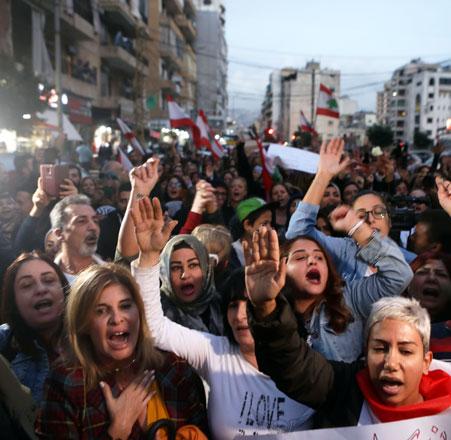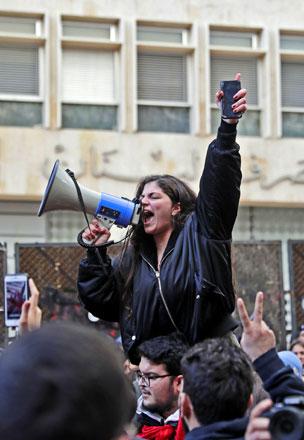You are here
Job losses and pay cuts as Lebanon's economy crumbles
By AFP - Nov 28,2019 - Last updated at Nov 28,2019

Lebanese women, from the Chrisitan-dominated neighbourhood of Ain Al Remmaneh and Shiite-dominated neighbourhood of Shiah, shout slogans as they march through Beirut’s former demarcation line on Wednesday (AFP photo)
BEIRUT — Weeks into a protest movement partly driven by a collapsing economy, Lebanese interior architect Laeticia Nicolas was called in by her boss and told she was fired.
"There had been fewer and fewer projects for a year," said the 28-year-old, who since October 17 has taken part in unprecedented anti-government protests sweeping the country.
"Before the revolution began, they warned us they'd be paying just half our salaries in exchange for reducing working hours," she said.
But as the protests gained momentum, he downsized his team. Nicolas was informed of the bad news at the end of the month when she received her salary.
"It's not because of the revolution, but it may well have accelerated things," she said.
After years of political turmoil, the Lebanese economy is in a sharp downturn, banks have restricted access to dollars while prices have risen.
Amid the crisis, thousands of Lebanese say their jobs are under threat.
Activists have denounced what they call illegal lay-offs and urged the labour ministry to intervene.
Some people, like Nicolas, have lost their jobs altogether; others have been told to work part-time for a fraction of their original salary.
A woman who asked to be identified as "Mary" was among those forced to take a pay cut. For 16 years she has been a saleswoman at an upper-end women's clothing shop, and now she fears her job may be on the line.
"Since the start of November we've been taking two extra days off a week," said the 46-year-old, who asked that her real name not be used in order to protect her job.
"They said they would have to pay us half our salaries."
'We fear the worst'
She said that she and around 20 colleagues did not object "because we fear the worst, and no one is going to risk losing their job in such circumstances".
"It's been bad for months. In recent days, the shop takings haven't even been 50,000 Lebanese pounds,” or around 30 euros, Mary said.
Economic growth in Lebanon has been battered by repeated political deadlock in recent years, compounded by the eight-year war in neighbouring Syria.
Successive Cabinets have failed to implement desperately needed reforms to redress a floundering economy heavily reliant on tourism and services.
The World Bank projected negative growth of 0.2 per cent in Lebanon for 2019, but now warns the recession could be even worse.
It has urged that a new Cabinet be swiftly formed, after the government stepped down less than two weeks into the protests, to avoid more Lebanese becoming poor.
Around a third of Lebanese live in poverty, and that figure could soon rise to half, according to the World Bank.
Unemployment, already above 30 per cent for young people, would also go up, it said.
A group of Lebanese banks and private businesses also warned of bleak times ahead.
"Thousands of companies are threatened with closure, and tens of thousands of employees and workers risk losing their jobs," they said.
The union of restaurant and bar owners has said 265 establishments have closed already, and that figure could reach 465 by the end of the year.
Begging for payment
In the month before the protests, banks began restricting access to dollars, sparking a greenback liquidity crisis.
Bilal Dandashli, who heads a small road safety equipment company he founded in the 1990s, said he was struggling.
"We can no longer import supplies from abroad," he said.
The Lebanese pound is pegged at around 1,500 pounds to the dollar, and both are used interchangeably in everyday transactions.
But caps on dollar withdrawals have forced people to resort to moneychangers, sending the unofficial exchange rate soaring to more than 2,200.
To make matters worse, Dandashli said customers were also not paying their debts.
"It's like begging for our own money," he said.
"One person owes me $20,000, and today he turns up with a cheque for $1,000. How are we supposed to continue like this?"
Dandashli says he fears for the future of his 10 employees, whom he has continued to pay in full despite no work for two months.
"I could hang on for another few months or close. But it would break my heart to see everything I've built up over the years collapse."
In the latest sign of things getting worse, petrol station owners began an open-ended strike on Thursday because of losses caused by the plunging pound against the dollar.
Nicolas, the newly unemployed interior architect, is now applying for jobs and considering a proposal to work in Kuwait.
"If travelling is the only option, I'll have to take it," she said through tears.
"I'll start over. Just not here, as here there is no hope."
By Layal Abou Rahal
Related Articles
BEIRUT — Eighteen-year-old domestic worker Mary came to Lebanon to help support her family, but now a financial crisis is preventing her fro
BEIRUT — Inside a Lebanese bank, a woman screams for her salary.
BEIRUT — Depositors scuffled and long lines formed at Lebanese banks on Monday as they partially reopened after a week-long closure followin














